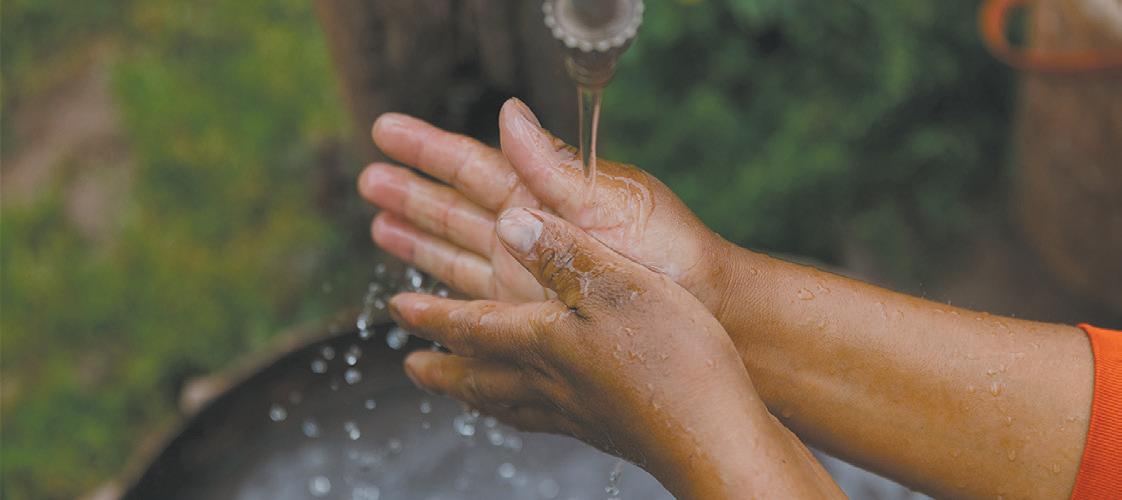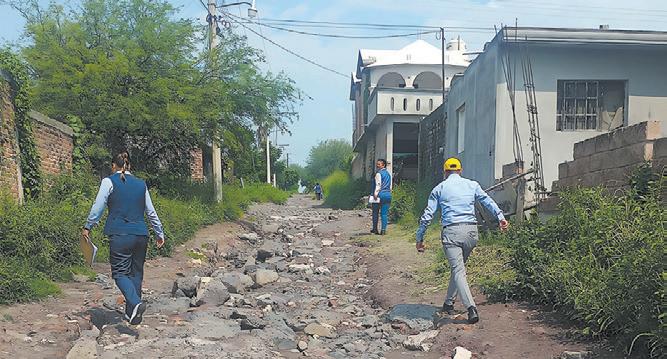
5 minute read
Women Leading the Way: How Financial Inclusion is Transforming Communities in Mexico
Bringing safe water to communities in need © Water.Org
BY ROCÍO CAVAZOS, REGIONAL DIRECTOR, LATIN AMERICA, WATER.ORG
Women Leading the Way: How Financial Inclusion is Transforming Communities in Mexico
Every year, on International Women’s Day, we celebrate the leadership of women who are creating change in their communities. In my work across Latin America, I have seen how women drive solutions that change their families’ lives—especially when they have access to the right resources. For millions of women, safe water is the foundation of opportunity. Today, 2.2 billion people lack access to safe water and 3.5 billion lack access to a toilet. Women and girls spend 200 million hours daily collecting water—time that could be spent on education, work, or caring for family.
Financing is often the missing link. Many families could afford a water connection or toilet if they could pay over time. Without access to small loans, they must secure water daily for survival rather than investing in longterm solutions.
Access to affordable financing gives women the power to secure water and sanitation solutions that change their lives and expand their opportunities.
Women like Fabiola, Maria Dolores, and Nancy know firsthand how life-changing safe water can be. What started as a small loan to improve access at home became an opportunity to lead, advocate, and help more women gain access to this essential resource.
FROM BORROWERS TO LEADERS
I first met Maria Dolores, Nancy, and Fabiola through our work with Caja Cortazar, a financial institution in Guanajuato, Mexico. Like many women in her community, Maria Dolores secured a loan to bring safe water and sanitation to her family. One day, while making a payment, she noticed a job posting at the credit union. She applied, was hired, and soon became part of something bigger. A year later, she joined the Water Project, a collaboration between Caja Cortazar and Water.org, to help families finance their own water and sanitation solutions.
"At first, I wasn’t sure if I wanted to take the risk. But I said to myself, ‘Try it for a few months.’ And now, I’m still here because I love it."
Now, Maria Dolores helps families secure small loans for water solutions and leads education sessions to ensure safe water access is sustainable.
Nancy’s journey was similar. Before securing a loan, her family lacked reliable access to safe water, making daily life more challenging. In 2023, she took out a loan at Caja Cortazar, which gave her family access to safe water at home, freeing up time and expanding her choices.
Inspired by Maria Dolores, she wanted to help others do the same, so Nancy applied for a job as a janitor at the bank. Fabiola, a leader at Caja Cortazar who had also borrowed to install a water tank at home, saw Nancy’s potential and offered her a role with the Water Project.
“I used to watch my coworker working on the Water Project," she said. "I thought, ‘That’s something I’d love to do.’ When they offered me a role, I didn’t hesitate."
Now, Nancy helps families secure financing and install water solutions, which allows them to improve their health, create safe home environments, and reclaim time for work, education, and family.
Maria Dolores, Nancy, and Fabiola’s paths—from borrowers seeking access to safe water to leaders expanding it for others— demonstrate the transformative power of financial inclusion. With access to safe water, they could move beyond survival, step into leadership, and create opportunities beyond their homes and communities.

WHY FINANCIAL SOLUTIONS MATTER
Lack of access to safe water and sanitation costs the global
economy $260 billion yearly, limiting opportunities for education, work, and progress.
For millions, the challenge isn’t availability—it’s affordability. That’s why Water.org created WaterCredit, a solution that works with financial institutions to make small, affordable loans available for water and sanitation.
By partnering with lenders, Water.org helps families secure the financing they need to implement lasting solutions at home. With a 98 percent repayment rate, this approach continues to scale, contributing to Water.org’s efforts to reach more than 73 million people worldwide with safe water or sanitation.
Women are driving this progress—90 percent of WaterCredit borrowers are women, showing that access to small loans provides safe water and more—allowing them to make choices that change their futures. With the ability to invest in lasting water solutions, women are strengthening their families and communities.
"When women see what we do, they say, ‘I want to be part of this,’" Nancy said.
A MODEL FOR CHANGE
Through my work across Latin America, I have met women who are using affordable financing to secure lasting access to safe water, changing their lives and the lives of their families. Maria Dolores, Nancy, and Fabiola’s stories reflect a broader reality.
These experiences demonstrate that financial inclusion is a key driver of water security, ensuring families have the resources they need to thrive.
When asked what this work has meant for her, Maria Dolores said, "We are proof that women don’t have to stay in the roles others expect of us. If you set your mind to something, you can achieve it."
THIS INTERNATIONAL WOMEN’S DAY, LET’S INVEST IN WOMEN’S POTENTIAL
Women are at the center of the global water crisis—making daily decisions about collecting, using, and managing water for their families. Yet financial barriers often limit their choices. Financial inclusion shifts this reality. With the right resources, women can secure safe water, improve their well-being, and create new opportunities—for themselves and their families.
As we recently celebrated International Women’s Day, we recognize that investing in women is investing in stronger, more resilient communities. When women have the power to make lasting change, their impact extends far beyond their own homes.
Join us in making safe water and sanitation possible for more women and families worldwide.










